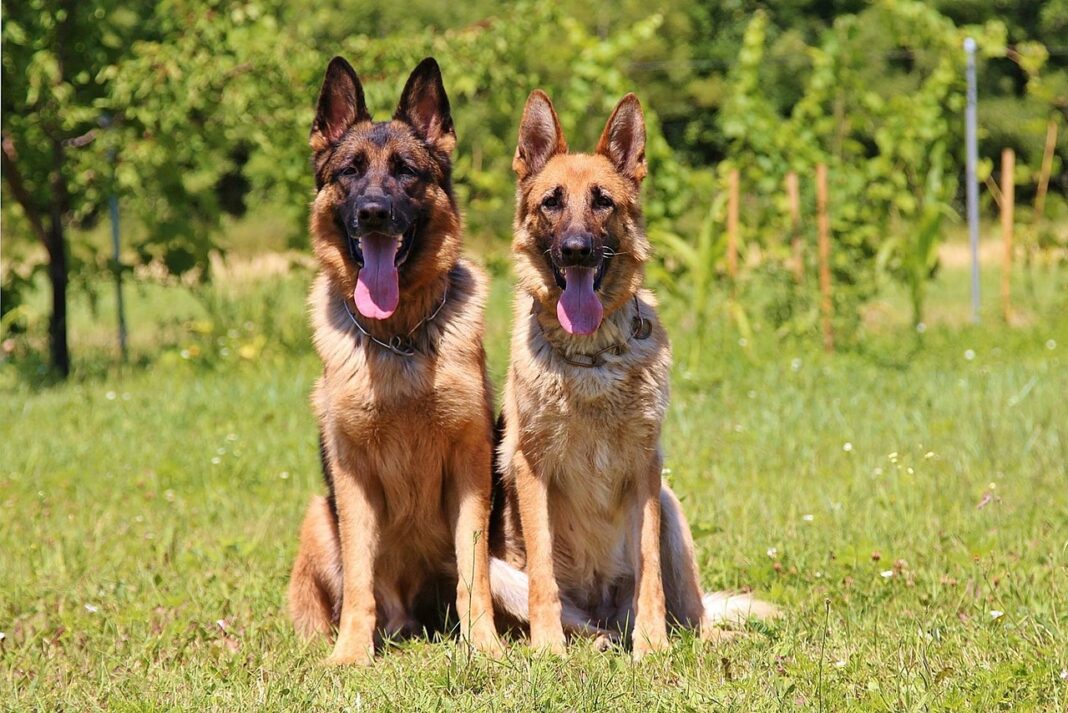The German Shepherd (GSD) is a breed well-known for its versatility and intelligence. Originally bred as a working dog to herd and guard sheep, its adaptability has seen it put to work in numerous roles, from assisting the police and military to serving as guide dogs for the visually impaired. This breed guide will provide a comprehensive overview of the German Shepherd, providing valuable information on its characteristics, care, and training.
Table of Contents
1. Distinctive Features of the German Shepherd Dog Breed
- Female Weight: 50-70 pounds (22.7-31.8 kg)
- Male Weight: 65-90 pounds (29.5-40.8 kg)
- Female Size: 22-24 inches (55.9-61.0 cm)
- Male Size: 24-26 inches (61.0-66.0 cm)
- Life Expectancy: 9-13 years
- Breed Group: Herding and Driving Dogs
The German Shepherd is a strong and well-proportioned breed with a muscular build. It has a distinct look, characterized by its medium size, erect ears, and bushy tail. The breed has a thick double coat that provides protection against the elements and a straight, confident gait.
2. Character and Behavioural Traits of the German Shepherd
The German Shepherd is ranked highly in many categories, which are represented by the following percentages:
| Suitable for Beginners: | 70% |
| Apartment Living: | 40% |
| Tolerates Being Alone: | 30% |
| Affectionate: | 80% |
| Child-Friendly: | 85% |
| Dog-Friendly: | 70% |
| Friendly Toward Strangers: | 60% |
| Sheds Little: | 10% |
| Easy to Groom: | 40% |
| Drools Little: | 80% |
| Rarely Sick: | 50% |
| Easy to Train: | 90% |
| Intelligent: | 95% |
| Barks or Howls Little: | 30% |
| Requires Little Exercise: | 10% |
| Obedient: | 95% |
They are known for being highly intelligent and versatile, adapting well to a range of tasks. Though they can be aloof with strangers, they are usually very affectionate with their families. This breed is not ideal for apartment living as they require lots of exercise.
3. Evaluating if a German Shepherd is the Right Dog Breed for You
Considering a German Shepherd as a pet? This breed thrives in an active, working environment and requires plenty of exercises and mental stimulation to stay happy and healthy. They are best suited to families and individuals who can dedicate time to training and socialization, allowing them to harness their intelligence and instincts in a positive way.
4. Insights into German Shepherd Puppies: What to Expect

German Shepherd puppies are playful, curious, and eager to learn. They require early socialization and training to ensure they grow into balanced and well-mannered adults. Expect a lot of energy and a strong inclination for chewing in the early months. Regular veterinary check-ups and a nutritious diet will contribute to their overall health and development.
5. Diverse Types of German Shepherds: An Overview
There are several types of German Shepherds including the American German Shepherd and the European German Shepherd. The American German Shepherd is typically bred for show, while the European type is often used for work such as police or military service. Both types are recognized by major kennel clubs.
6. Color Variations in the German Shepherd Dog Breed
German Shepherds come in a variety of colors including black, white, sable, black and tan, and blue. The most common is the black and tan variation. Their coats can be short, medium, or long, with the medium and long hair varieties requiring more grooming.
7. Understanding the Costs Associated with Owning a German Shepherd
German Shepherd puppy costs can range from $500 to $1500, depending on the breeder and the pedigree of the dog. An adult German Shepherd price may vary depending on whether it is a rescue dog or purchased from a breeder. A trained working German Shepherd can cost several thousand dollars. Ongoing costs of owning a German Shepherd include food, grooming, veterinary check-ups, and health insurance.
8. How to Select Trustworthy German Shepherd Breeders
Reputable breeders can be found through kennel club registries or recommendations from veterinarians. Trustworthy breeders prioritize the health and temperament of their dogs over profit. Healthy German Shepherds should be lively, with clear eyes, clean ears, a shiny coat, and they should be of an appropriate weight for their age and size.
9. What to Look for When Buying a German Shepherd Puppy
When you’re in the market for a German Shepherd puppy, it’s crucial to do your due diligence to ensure you’re getting a healthy, well-socialized dog. Here are some tips to guide you:
- Visit the Breeder: Always visit the breeder’s facility in person. This allows you to see the conditions in which the puppies are raised and to meet the puppy’s parents. A clean, well-organized environment is a good sign.
- Ask for Health Certifications: Reputable breeders will have health certifications for both parent dogs. These should include tests for common breed-specific issues like hip dysplasia and eye conditions.
- Check Vaccination Records: Ensure that the puppy has had its first set of vaccinations and has been dewormed. Ask for documentation.
- Observe Puppy Behavior: Look for a puppy that is active, playful, and curious. Avoid puppies that appear lethargic, fearful, or overly aggressive.
- Physical Examination: The puppy should have clear eyes, clean ears, and a shiny coat. Check for any signs of illness like nasal discharge or skin issues.
- Ask Questions: Don’t hesitate to ask the breeder questions about the puppy’s diet, socialization, and any training they may have started. A good breeder will be happy to answer your questions.
- Get a Vet Check: Once you’ve chosen a puppy, it’s advisable to have it examined by a veterinarian as soon as possible to confirm its health status.
- Review the Contract: Make sure you fully understand the purchase agreement or contract. It should cover terms regarding health guarantees and return policies.
- Health Checkups: When viewing a puppy, it’s recommended to inquire about any health checkups the puppy has undergone. This can include general wellness exams, vaccinations, and screenings for common breed-specific illnesses.
By following these guidelines, you’ll be better equipped to find a healthy, happy German Shepherd puppy that will be a great addition to your family.
10. Common Breed-Specific Illnesses and Health Issues of the German Shepherd
German Shepherds are generally robust dogs, but like all breeds, they are prone to certain health issues. Some of the most common include:
- Hip and Elbow Dysplasia: This is a genetic condition that can lead to arthritis and pain. Early diagnosis and treatment are crucial.
- Degenerative Myelopathy: This is a progressive disease of the spinal cord that can lead to paralysis.
- Gastric Torsion (Bloat): This is a life-threatening condition that requires immediate medical attention. It occurs when the stomach twists on itself.
- Allergies: German Shepherds can be prone to skin allergies, which can cause itching and discomfort.
- Eye Conditions: Such as Progressive Retinal Atrophy (PRA) and cataracts.
- Epilepsy: Some German Shepherds are prone to seizures, which can usually be managed with medication.
Regular veterinary check-ups and a healthy diet can go a long way in preventing or managing these conditions. Always consult your veterinarian for the most accurate health advice for your German Shepherd.
11. German Shepherd Training Tips and Techniques
German Shepherds are intelligent and eager to learn, making them relatively easy to train. Consistency, positive reinforcement, and early socialization are key to training this breed. They respond well to reward-based training and require a balanced mix of physical exercise and mental stimulation.
12. Essential Care Tips for a Healthy and Happy German Shepherd
Proper nutrition, regular exercise, grooming, and veterinary care are essential for the well-being of a German Shepherd. Regular check-ups can help detect and manage breed-specific health problems. Brushing them regularly can help manage shedding and keep their coat healthy.
13. A Gallery of Inspiring German Shepherd Pictures
A typical German Shepherd carries a confident and watchful expression, showcasing their alert and intelligent nature. Their images often depict them in action – running, jumping, or obediently performing tasks.
The German Shepherd is truly a special breed – intelligent, loyal and versatile. Whether as a family pet or a working dog, they bring a lot of joy and value to their owners. Owning a German Shepherd requires commitment, but the rewards are immense. It’s no wonder that this breed continues to be one of the most popular around the world.



